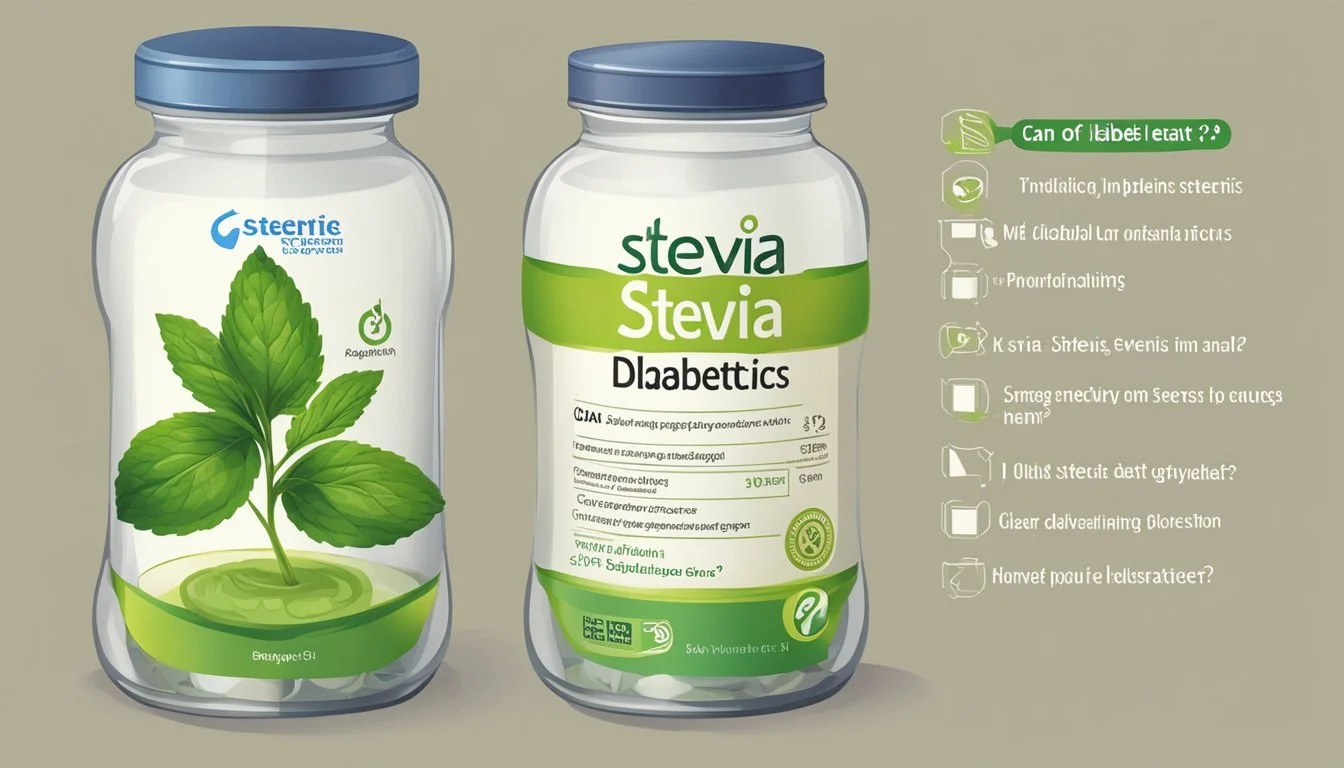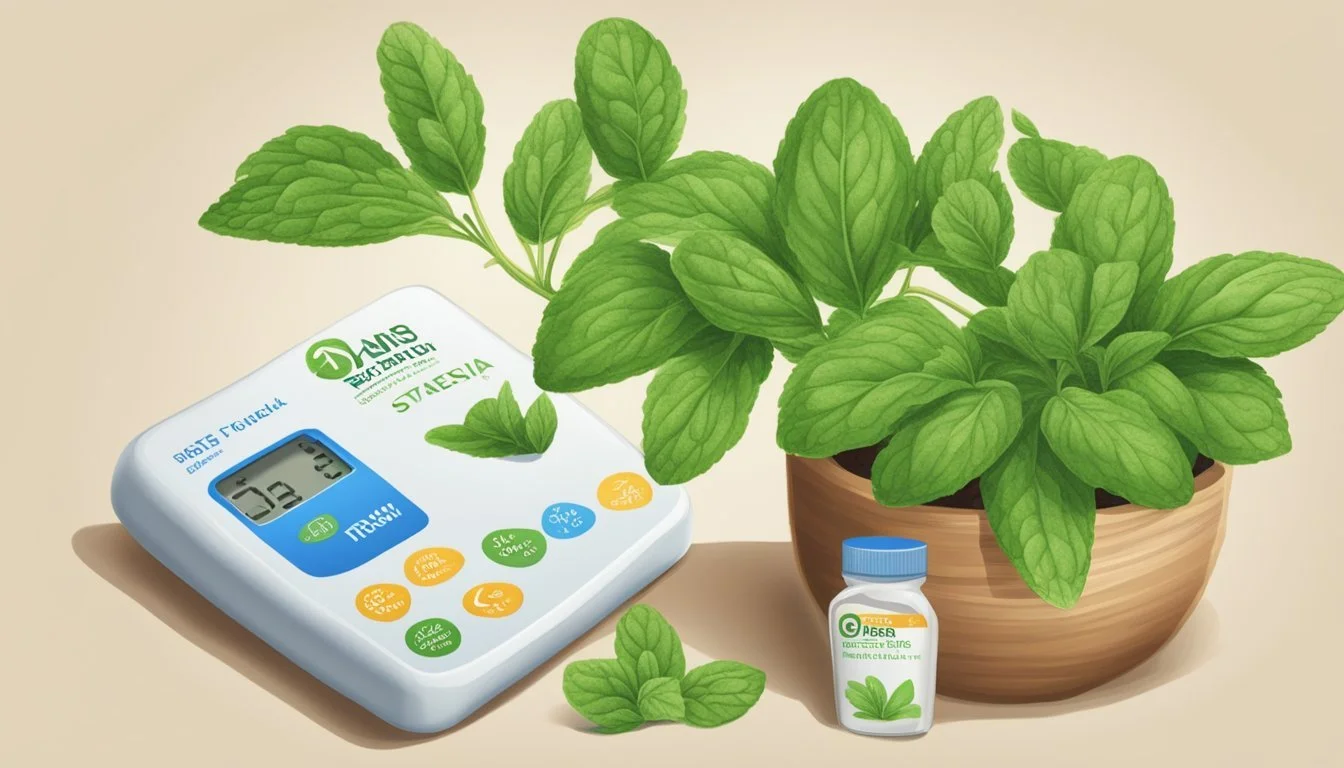Can Diabetics Eat Stevia Glycerite?
Exploring the Benefits and Risks
For individuals managing diabetes, finding effective sugar alternatives is critical. Stevia, a natural sweetener derived from the leaves of the Stevia rebaudiana plant, offers a promising option. Stevia glycerite, a derivative of stevia, can be consumed by diabetics as it does not raise blood glucose levels. This makes it a suitable sugar substitute for those looking to maintain stable blood sugar levels without sacrificing sweetness in their diet.
Studies have shown that stevia not only helps manage blood sugar levels but may also improve insulin sensitivity. These benefits make stevia glycerite an appealing choice for diabetics. Moreover, this sugar substitute provides essential nutrients like vitamins A, B3, C, and minerals such as magnesium, potassium, selenium, and zinc, contributing to a healthier dietary profile.
The inclusion of stevia glycerite in foods and drinks can help diabetics enjoy many of their favorite treats without the negative impact of regular sugar. By choosing stevia glycerite, individuals can better manage their diabetes and still savor the sweetness they crave.
Understanding Diabetes and Dietary Restrictions
Managing diabetes involves careful control of blood sugar levels and awareness of dietary intake. The role of sugar and the importance of monitoring blood sugar levels are critical considerations for individuals with diabetes.
Role of Sugar in Diabetes Management
Sugar intake directly impacts blood glucose levels, making it a focal point in diabetes management. When consumed, sugar breaks down into glucose, which then enters the bloodstream. For people with type 2 diabetes, the body's insulin response may be insufficient or ineffective, leading to elevated blood glucose levels.
Carbohydrates also play a significant role since they convert to glucose during digestion. Those with diabetes often need to monitor carbohydrate intake to prevent spikes in blood sugar. Replacing regular sugar with alternatives like Stevia can help manage these levels more effectively by offering a sweetening solution without directly raising blood glucose.
Importance of Monitoring Blood Sugar Levels
Regular monitoring of blood sugar levels is essential for individuals with diabetes. Consistent checks help in adjusting diet and medication, ensuring that blood glucose remains within target ranges. This practice can prevent both hyperglycemia and hypoglycemia, which can have severe health implications.
Tools like glucometers enable frequent blood glucose testing at home. Keeping a log of blood sugar readings can assist healthcare providers in tailoring diabetes treatment plans. By closely observing these levels, individuals can make informed decisions about their diet and lifestyle choices, improving overall diabetes management and health outcomes.
Stevia Glycerite: A Profile
Stevia glycerite, derived from the stevia plant, is widely used as a natural sweetener due to its minimal impact on blood sugar levels. Understanding its origin and production along with the chemical composition of steviol glycosides can help highlight its benefits for diabetics.
Origin and Production
Stevia glycerite originates from the stevia rebaudiana plant, native to Paraguay and Brazil. The plant's leaves have been used for centuries as a sweetener, often referred to as sweetleaf.
The production process involves extracting the sweet compounds, primarily rebaudioside A, from the leaves. These compounds are then combined with glycerin to form stevia glycerite.
This extraction and combination result in a product that is much sweeter than sugar but with no calories or carbs, making it suitable for people with diabetes.
Chemical Composition of Steviol Glycosides
The primary sweetening agents in stevia glycerite are steviol glycosides, which include rebaudioside A, stevioside, and other related compounds. Steviol glycosides are approximately 200-400 times sweeter than sucrose.
They do not metabolize in the same way as sugar, leading to negligible glycemic impact. This makes stevia glycerite particularly beneficial for maintaining stable blood glucose levels.
Rebaudioside A is often noted for its clean, sweet taste without the bitterness some other compounds might have. These glycosides are stabilized with glycerin, ensuring a longer shelf life and ease of use in various food and beverage applications.
Comparing Sweeteners
Stevia and stevia glycerite are popular alternatives to sugar among diabetics. Comparing them with artificial sweeteners and other natural options can help individuals make informed choices.
Stevia vs Artificial Sweeteners
Stevia, a natural plant-based sweetener, is many times sweeter than sugar without adding calories or increasing blood glucose levels. Some brands, however, mix stevia with maltodextrin or dextrose, which can affect blood sugar.
Artificial sweeteners like aspartame, sucralose, and saccharin are synthetic and often used due to their zero-calorie properties. Aspartame is commonly found in diet beverages, while sucralose is praised for its heat stability, making it suitable for cooking. Saccharin, one of the oldest artificial sweeteners, is less commonly used today due to a lingering aftertaste and historical health concerns.
Artificial sweeteners are typically cheaper and more accessible but may have health risks, such as potential digestive issues or cancer risk concerns, although they are generally regarded as safe by health authorities in moderate use. Diabetics often prefer natural options like stevia for fewer side effects.
Stevia Glycerite and Other Natural Alternatives
Stevia glycerite is a liquid form of stevia, mixed with glycerol, and offers a smooth, less bitter taste. It is low-calorie, doesn't spike blood sugars, and is often used by individuals managing diabetes.
Other natural alternatives include monk fruit, erythritol, xylitol, and allulose. Monk fruit is another plant-based sweetener with zero calories, and it is less likely to have a bitter aftertaste. Erythritol and xylitol are sugar alcohols that provide bulk and texture similar to sugar but with fewer calories. Erythritol, in particular, doesn’t affect blood sugar levels and is well-tolerated by the digestive system.
Allulose is a rare sugar that the body absorbs but does not metabolize, meaning it provides sweetness without the calories or blood sugar effects. Each natural sweetener comes with its distinct pros and cons, and individual tolerance can vary, making it crucial for diabetics to monitor their responses when introducing new sweeteners into their diet.
Health Impacts of Stevia Glycerite
Stevia glycerite is often used as a non-caloric sweetener, which can impact glycemic response and support weight management efforts. These attributes make it a topic of interest for diabetics and individuals combating obesity.
Glycemic Response and Diabetes
Stevia glycerite does not cause a spike in blood glucose levels, making it a suitable sugar substitute for those with diabetes. This non-nutritive sweetener is particularly beneficial because it does not interfere with insulin levels, thus maintaining stable blood sugar.
Studies have shown that pure stevia does not affect glycemic index, allowing individuals to enjoy sweetness without the associated risks of high blood sugar.
Moreover, avoiding additives like maltodextrin and dextrose is crucial, as they can inadvertently raise blood glucose levels. Using pure formulations ensures that diabetics can safely incorporate stevia glycerite into their diet.
Weight Management and Obesity
Stevia glycerite can assist in weight management by reducing overall energy intake. Unlike sugar, it contains no calories, making it an effective tool for those trying to lose weight.
This is particularly important for individuals dealing with obesity, as it allows them to reduce calorie consumption without sacrificing sweetness. Replacing sugar with stevia glycerite can help lower body weight and reduce the risk of obesity-related conditions.
Additionally, using stevia glycerite may positively influence appetite control, as it does not contribute to increased energy intake. Maintaining a balanced diet with stevia glycerite can prevent weight gain and support healthier body weight management.
The FDA's Stance on Stevia Glycerite
The FDA recognizes stevia glycerite as a safe sugar substitute under specific conditions. This section will cover its regulatory status and guidelines for use.
GRAS Status and Regulatory Guidelines
The Food and Drug Administration (FDA) has granted stevia glycerite the status of Generally Recognized as Safe (GRAS). Under the GRAS designation, specific conditions must be met. This status applies to high-purity stevia extracts, such as Reb A, when used in certain food categories.
Regulatory guidelines indicate that products containing stevia glycerite as additives must meet purity standards. These nonnutritive sweeteners must not be mixed with additives that could affect blood sugar levels, such as maltodextrin. The FDA ensures these products are labeled correctly, listing each ingredient clearly.
The FDA monitors the marketplace to ensure compliance with these regulations, safeguarding the health of consumers, especially those with diabetes.
Practical Considerations for Diabetics
When integrating Stevia glycerite into a diabetic diet, it's essential to understand both the practical applications and physiological impacts. This section provides insights into how diabetics can incorporate Stevia into their daily meals and its effect on insulin production.
Incorporating Stevia in the Diabetic Diet
For diabetics looking to replace sugar, Stevia glycerite can be a versatile sweetener. It is often added to foods and beverages to maintain flavor without the blood sugar spikes associated with traditional sugar.
Tea, coffee, and other drinks can benefit from the use of Stevia. Certified products must not contain additives like maltodextrin or dextrose, which can affect blood glucose levels. When baking, it's essential to use pure Stevia glycerite as even minor additives can alter insulin response.
Understanding Stevia's Effect on Insulin Production
Research indicates that Stevia does not adversely affect blood sugar levels in diabetics. Stevia may also enhance insulin sensitivity. This makes it a suitable option for managing blood sugar.
Stevia contains beneficial compounds that have shown potential to lower blood glucose levels. However, individuals should monitor their glucose regularly to ensure that Stevia is part of a balanced diet.
When choosing Stevia products, it’s crucial to opt for those verified to contain no harmful additives. Proper management includes understanding both immediate and long-term impacts on insulin production and overall glycemic control.
Potential Side Effects and Concerns
Consuming Stevia glycerite, while beneficial in many ways, can come with certain side effects and risks, particularly impacting digestion and long-term health.
Digestive Impact and Allergies
Stevia glycerite contains sugar alcohols, which can lead to digestive issues such as bloating and stomach cramps in some individuals. Symptoms may also include nausea and, occasionally, vomiting.
People who are sensitive or allergic to steviol glycosides, the active compounds in Stevia, may experience allergic reactions. These can manifest as skin rashes or itchiness. It's also important to monitor intake, as excessive consumption could exacerbate these digestive concerns.
Long-Term Health Risks
The long-term health implications of Stevia glycerite consumption are still under study. Some reports suggest a potential impact on liver health and hormone disruption, although these findings are not conclusive.
Stevia has not been linked to weight gain, and its use could help manage blood sugar levels. However, concerns about cancer risk from associated chemicals like dextrose or maltodextrin in some products remain a topic of ongoing scientific investigation.
The FDA deems stevia leaf extract safe, but users should remain cautious, especially if they are prone to inflammation or have other underlying health conditions. Monitoring intake and choosing pure forms of stevia can mitigate some of these potential risks.
Advantages of Stevia Glycerite
Stevia glycerite offers several benefits such as low-caloric intake and notable environmental and cultural significance. These factors make it an appealing choice for diabetics and those interested in sustainable food practices.
Caloric Intake and Nutritional Benefits
Stevia glycerite, derived from the Stevia rebaudiana plant, is a zero-calorie sweetener. This characteristic makes it favorable for individuals managing their caloric intake, such as diabetics. Unlike sugar, stevia glycerite does not have any carbohydrates, which aids in better blood sugar control.
Additionally, stevia contains beneficial components like antioxidants and has anti-inflammatory properties. For diabetics, this can be particularly advantageous as inflammation is often associated with chronic high blood sugar levels. Using stevia glycerite can satisfy sweet cravings without compromising health.
Environmental and Cultural Significance
Originating from Paraguay and Brazil, stevia has a rich cultural history in South America. Indigenous populations have used stevia leaves for centuries not just for their sweet flavor but also for medicinal purposes. This long-term usage underscores the plant's safety and utility.
Cultivation of stevia is environmentally beneficial. It's a sustainable crop requiring less land and water compared to traditional sugarcane. The reduced ecological footprint makes stevia an eco-friendly alternative.
By choosing stevia glycerite, consumers not only benefit from its nutritional advantages but also support sustainable agricultural practices rooted in rich cultural traditions.
Usage Recommendations
Stevia glycerite is a safe and effective sugar alternative for people with diabetes. Proper dietary integration and mindful consumption can help manage blood sugar levels while allowing a variety of culinary uses.
Dietary Integration
Stevia glycerite can be incorporated into a wide range of foods and beverages. It is an excellent option for sweetening oatmeal, yogurt, smoothies, and baked goods without affecting blood sugar levels significantly.
Key Points:
Oatmeal and Yogurt: Add a few drops to maintain sweetness without additional carbs.
Smoothies: Enhance the taste by mixing it with fruits and vegetables.
Baked Goods: Substitute for sugar in recipes to reduce caloric intake.
Consumption Tips
When using stevia glycerite, start with a small amount and adjust according to taste. Monitoring blood sugar levels helps in understanding its impact on your body. Pairing it with foods high in fiber can improve satiety and manage hunger effectively.
Key Strategies:
Start Small: Adjust sweetness to your preference.
Monitor Levels: Keep track of blood glucose changes.
Pair with Fiber: Combine with fiber-rich foods to enhance fullness and control hunger.
Stevia glycerite offers a practical solution for those needing to manage their blood sugar without sacrificing taste.
Final Thoughts
Stevia glycerite, a derivative of the stevia plant, serves as a natural sweetener with potential benefits for those managing diabetes. Being many times sweeter than sugar yet nearly calorie-free, it is a practical sugar alternative.
Stevia does not raise blood sugar levels, making it safe for diabetics. Pure stevia products, including stevia glycerite, are notable for this reason.
Key Benefits:
Doesn't Affect Blood Sugar: Stevia glycerite has no glycemic impact.
Natural Sweetener: Derived from the stevia plant, it is a non-artificial option.
Calorie-Free: Suitable for those seeking to reduce calorie intake.
Important Considerations:
Added Ingredients: Some stevia products include additives like maltodextrin, which can impact blood sugar levels.
Essential Nutrients: Stevia also provides vitamins and minerals such as A, B3, C, magnesium, potassium, selenium, and zinc.
For diabetics, replacing sugar with stevia glycerite can be an effective part of dietary management. Always check the product labels to ensure no hidden additives affect its efficacy.









